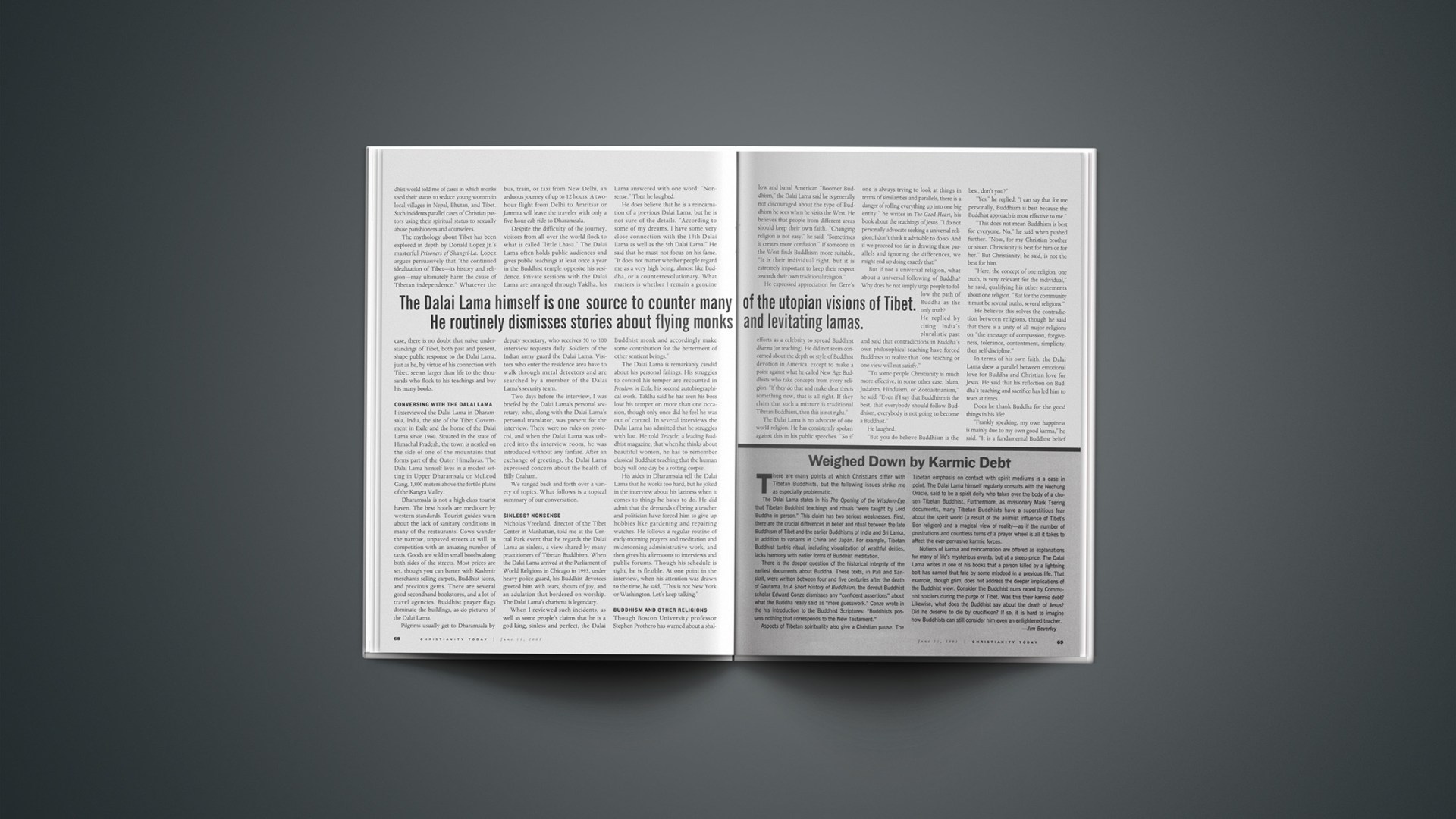The Dalai Lama states in his The Opening of the Wisdom-Eye that Tibetan Buddhist teachings and rituals “were taught by Lord Buddha in person.” This claim has two serious weaknesses. First, there are the crucial differences in belief and ritual between the late Buddhism of Tibet and the earlier Buddhisms of India and Sri Lanka, in addition to variants in China and Japan. For example, Tibetan Buddhist tantric ritual, including visualization of wrathful deities, lacks harmony with earlier forms of Buddhist meditation.
There is the deeper question of the historical integrity of the earliest documents about Buddha. These texts, in Pali and Sanskrit, were written between four and five centuries after the death of Gautama. In A Short History of Buddhism, the devout Buddhist scholar Edward Conze dismisses any “confident assertions” about what the Buddha really said as “mere guesswork.” Conze wrote in his introduction to the Buddhist Scriptures: “Buddhists possess nothing that corresponds to the New Testament.”
Aspects of Tibetan spirituality also give a Christian pause. The Tibetan emphasis on contact with spirit mediums is a case in point. The Dalai Lama himself regularly consults with the Nechung Oracle, said to be a spirit deity who takes over the body of a chosen Tibetan Buddhist. Furthermore, as missionary Mark Tsering documents, many Tibetan Buddhists have a superstitious fear about the spirit world (a result of the animist influence of Tibet’s Bon religion) and a magical view of reality—as if the number of prostrations and countless turns of a prayer wheel is all it takes to affect the ever-pervasive karmic forces.
Notions of karma and reincarnation are offered as explanations for many of life’s mysterious events, but at a steep price. The Dalai Lama writes in one of his books that a person killed by a lightning bolt has earned that fate by some misdeed in a previous life. That example, though grim, does not address the deeper implications of the Buddhist view. Consider the Buddhist nuns raped by Communist soldiers during the purge of Tibet. Was this their karmic debt? Likewise, what does the Buddhist say about the death of Jesus? Did he deserve to die by crucifixion? If so, it is hard to imagine how Buddhists can still consider him even an enlightened teacher.
Copyright © 2001 Christianity Today. Click for reprint information.
Related Elsewhere
Other articles appearing in our Buddhism series today include:Buddhism’s Guru | The Dalai Lama, a spiritual hero to millions, works to liberate Tibet, calls on spirits, and believes Jesus lived previous lives. (June 8, 2001)
Basic Buddhism | What the Dalai Lama and his followers believe about God, Buddha, and other teachings. (June 8, 2001)
Blood and Tears in Tibet | The Dalai Lama says he appreciates Christian attempts to address persecution in his homeland. (June 8, 2001)
Inside CT: Straight Outta Dharamsala | Behind James A. Beverley’s report on the Dalai Lama (June 8, 2001)
Terry Muck, professor of religion at Austin (Texas) Presbyterian Theological Seminary and editor of Buddhist-Christian Studies , reviewed the Dalai Lama’s The Good Heart: A Buddhist Perspective on the Teachings of Jesus for Christianity Today sister publication Books & Culture. He has also written for Buddhist-Christian Studies on “Buddha through Christian Eyes.”
A 5-minute introduction to Buddhism, part of Buddhanet.net, explains basic beliefs and what can do for followers. Also on the site, insight meditation techniques, extensive resources about the history and culture of Buddhism and an online Buddhist Study Guide
Christianity Today columnist Chuck Colson discusses what he calls “Christianized Buddhism” at Breakpoint Online
Campus Life, a Christianity Today sister publication, explained Buddhism and other world religions from a Christian perspective for Teens.
Christianity Today‘s earlier coverage of Buddhism and the Dalai Lama includes:
Spirituality Without Religion | More Christians attracted to Dalai Lama’s teachings. (Dec. 6, 1999)
Goodbye, Dalai | China pressures South Africa president to refuse Meeting With Dalai Lama (Dec. 2, 1999)
Dalai Lama, Evangelical Leader Talk (Aug. 10, 1998)










